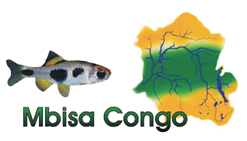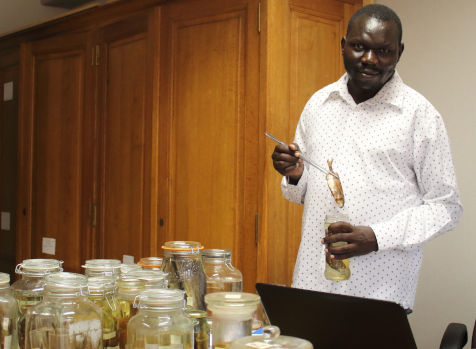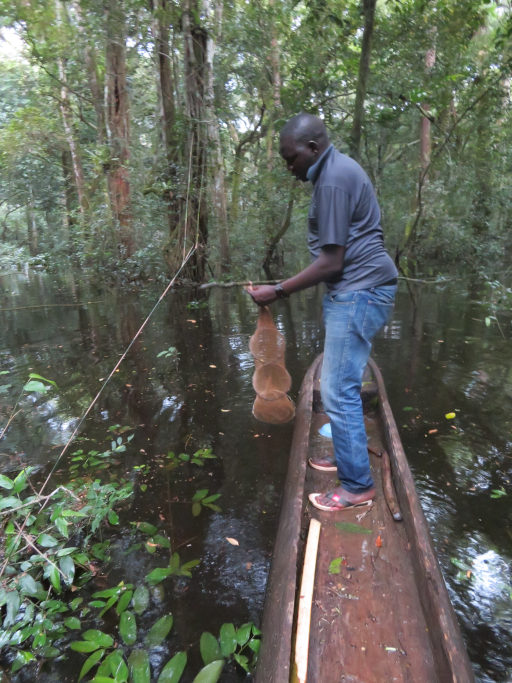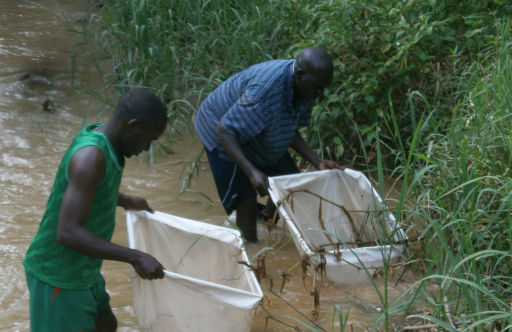MbiSa Congo: visiting scientists
Several ichthyologists from the partner institutions involved in the Mbisa-Congo project have completed a two- to three-month research stay at the RMCA.
Emmanuel Abwe
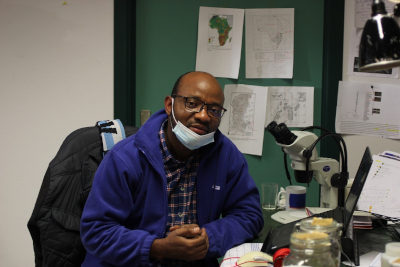
October 2021-January 2022
Emmanuel Abwe is a researcher at the “Unité des recherches en Biodiversité, gestion et Exploitation durable des Zones Humides (BEZHU)”, Faculty of Agricultural Sciences of the University of Lubumbashi (UNILU), Democratic Republic of the Congo (DRC). He is undertaking his doctoral studies at the KU Leuven since 2014 on the diversity and conservation of the fishes of the Kundelungu National Park (KNP). His doctoral studies have successively benefited from the funding of two projects of the framework agreement of the Royal Museum for Central Africa (RMCA) financed by the Directorate General for Development Cooperation and Humanitarian Aid of Belgium (DGD). The MbiSa Congo I project (2013-2018) enabled Emmanuel Abwe to:
- organise expeditions to the KNP,
- undertake study visits to the RMCA and other natural history museums such as the “Musée National d’Histoire Naturelle” (MNHN) and the “Zoologische Staatssammlung München” (ZSM); as to verify the identification of the fishes recently collected in the KNP,
- writing his PhD thesis. Subsequently, the MbiSa Congo II project (2019-2023) enable him to finalize the writing and to defend his PhD.
Emmanuel Abwe carried out a study visit in ichthyology at the Royal Museum for Central Africa (RMCA) during four months, from October 2021 to January 2022. His visit to the RMCA was mainly devoted to correcting his PhD thesis following the comments and recommendations of the jury members. Note that before starting this visit, E. Abwe had already pré-defended his PhD thesis online from Lubumbashi in the DRC (09/07/2021). All the major comments and recommendations of the jury members were incorporated into his thesis to the great satisfaction of all the jury members, who authorised him to defend his PhD thesis in January 2022. During this same visit E. Abwe also participated in a workshop for the evaluation and synthesis of the main results of the project “Exploiting the Genomic Record of Living Biota to Reconstruct the Landscape Evolution of South Central Africa”. This multidisciplinary project carried out in collaboration with partners from ZSM (Germany), Stellenbosch University, (South Africa) and Deutsches German Research Center for Geosciences (Germany) has as main objective the reconstruction of the evolution of the geomorphological landscape of South of Katanga and northern Zambia by the integrative use of molecular and geological dating. During this three-day workshop, organized online, E. Abwe presented the results on the phylogeography of the Amphilius uranoscopus group (Amphiilidae or Mountain catfishes), and the Kneria and Parakneria (Kneriidae or shellears) from Africa, with a focus on the southern Katanga and northern Zambia regions. The phylogeographic results of the Amphilius of this region revealed about 35 different lineages all, probably, representing new species for science. Among these, around 4 new species of the A. cryptobullatus group were measured during this visit to prepare their formal description.
"With the support of the Mbisa project, I was able to undertake expeditions during four years (2014-2017) in the rivers and lakes of the KNP. This allowed me to acquire a good knowledge of the fishes of the KNP and their natural habitats. In addition, I have been able to acquire experience in fieldwork, mainly the fishing, handling of collected fish (taking of fin-clips, photographs, etc.), conservation and transportation of the specimens. Under the supervision of my promoters, during my various stays at the RMCA, I was also introduced into various in-depth methods of morphological study in the systematics of fishes. I was in contact with other researchers in african ichthyology and stayed in other laboratories, among which the "Zoologische Staatssammlung München (ZSM / Germany)" where I was trained in the genetic study of fish. All this expertise, acquired through the MbiSa Congo I and II projects, is currently put at the disposal of the university where I work (UNILU) through the training of students in ichthyology, the supervision of students who want to work in ichthyology for their thesis (bachelor, masters and/or DEA thesis) and finally the systematic study of the fishes of the Upper Lualaba and Luapula-Mweru in general."
"Despite of the working pressure to finalize my PhD thesis, my stay at the RMCA was very useful, because it allowed me (i) to examine some type and non-type specimens of the different fish species to answer to some questions formulated by the jury, and (ii) to discuss directly with my promoters and other researchers at the RMCA on different aspects of my research. In addition, this stay was important because it allowed me to discuss all the questions asked by the members of the jury for my thesis with my two promoters from the RMCA. I have also finalised the data collection on fish for which their study was not finalized during my PhD, mainly the Amphilius of the A. cryptobullatus complex and the Kneria of the K. sp. ‘lutshipuka’ group. This will allow me to write the first drafts of the descriptions of the probable new species in these groups when I will be back home in the DRC."
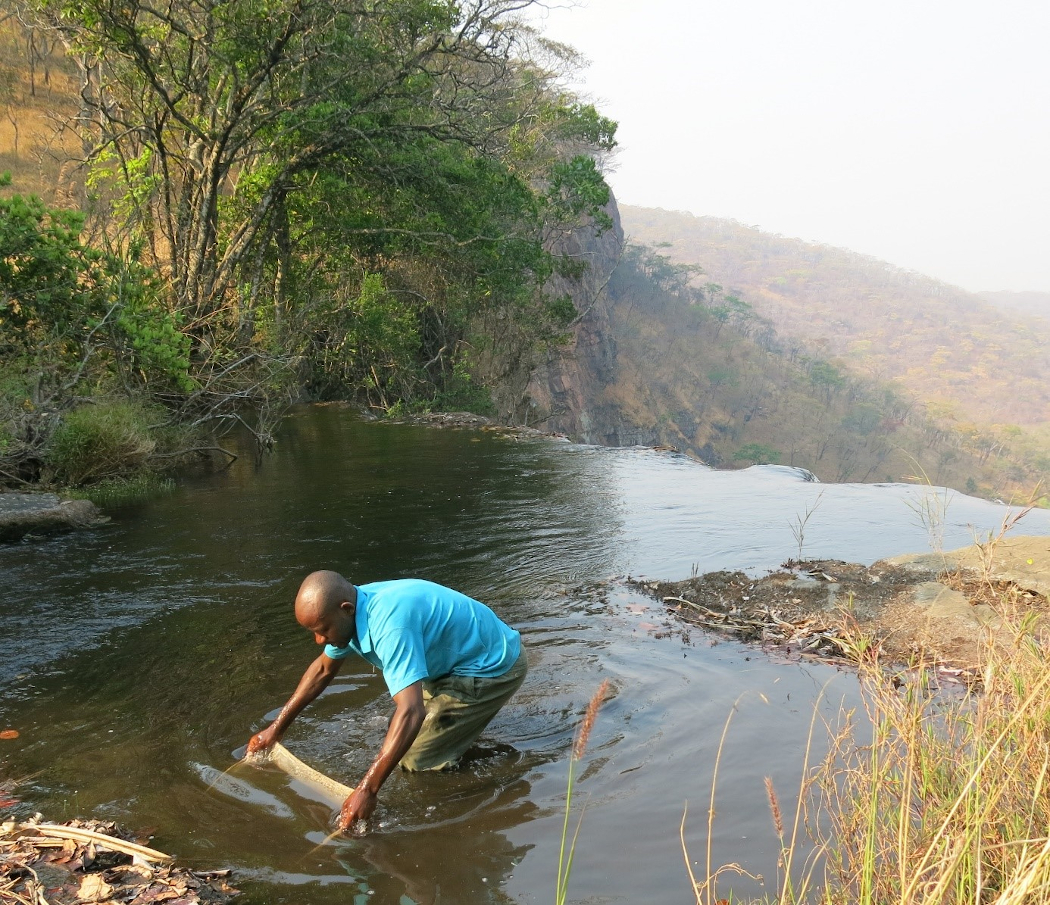
Dip net fishing just above Luansa Falls on the Luansa River (Buffer Zone of the Kundelungu National Park) (21/09/2017).
Emmanuel Abwe
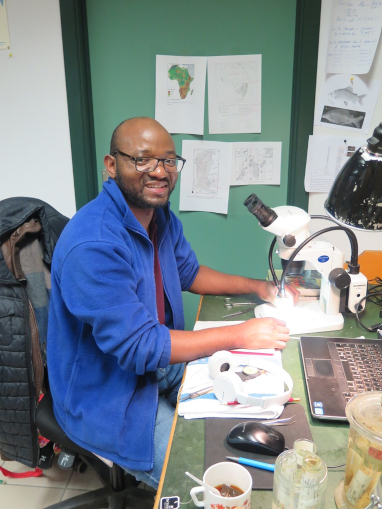
July-November 2019
Abwe Emmanuel is a researcher at the “Unité des recherches en Biodiversité, gestion et Exploitation durable des Zones Humides (BEZHU)”, Faculty of Agricultural Sciences of the University of Lubumbashi (UNILU), Democratic Republic of the Congo (DRC). He is undertaking his doctoral studies at the KU Leuven since 2014 on the diversity and conservation of the fishes of the Kundelungu National Park. His doctoral studies have successively benefited from the funding of two projects of the framework agreement of the Royal Museum for Central Africa (RMCA) financed by the Directorate General for Development Cooperation and Humanitarian Aid of Belgium (DGD). The MbiSa Congo I project (2013-2018) enabled Emmanuel Abwe to:
- organise expeditions to the KNP,
- undertake study visits to the RMCA and other museums such as the “Musée National d’Histoire Naturelle” (MNHN) and the “Zoologische Staatssammlung München” (ZSM); as to enable him to verify the identification of the fishes collected in the KNP,
- the writing of his thesis. Subsequently, the MbiSa Congo II project (2019-2023) enable him to finalise the writing in view of the preparation of his defence.
Emmanuel Abwe carried out a study visit in ichthyology at the Royal Museum for Central Africa for four months, from July to November 2019. During his visit to the RMCA, all the chapters of his thesis were written and corrected by its promoters. It mainly concerned:
- the checklist of fishes of the Kundelungu National Park (KNP);
- the revision of the Amphilius (Amphiliidae or Mountain Catfishes) of the A. uranoscopus group of the Kundelungu Plateau (KP) and its surroundings including the description of five new species all endemics, i.e. unique, for the region;
- the revision of the Kneria (Kneriidae or shellears) of the KP and its surroundings with the description of five new species all, also, endemic to the KNP and its surroundings.
During the same visit, E. Abwe also participated in the supervision of two DEA students from the University of Lubumbashi (UNILU) undertaking a study visit at the RMCA and both benefiting from an visiting allowance from the Mbisa I and II projects as well:
- Kiwele Mutambala Pacific revising the Parakneria (Kneriidae) of the Kundelungu and Upemba parks,
- Ngoy Kalumba Lewis revising the Kneria wittei (Kneriidae) of the Luanza River, Lower Luapula (Buffer Zone of the KNP) and the K. paucisquamata of the Luongo River, Middle Luapula.
"With the support of the Mbisa project, I was able to undertake expeditions during four years (2014-2017) in the rivers and lakes of the KNP. This allowed me to acquire a good knowledge of the fishes of the KNP and their natural habitats. In addition, I have been able to acquire experience in the fieldwork, mainly the fishing, the handling of the collected fish (taking of fin-clips, photographs, etc.), the conservation and transportation of the specimens. Under the supervision of my promoters during my various stays at the RMCA, I was introduced into various in-depth methods of morphological study in the systematic of fish. I was in contact with other fish taxonomist researchers and stayed in other laboratories, among which the "Zoologische Staatssammlung München (ZSM / Germany)" where I was trained in the genetic study of fish. All this expertise, acquired through the MbiSa Congo I and II projects, is currently put at the disposal of the university where I work (UNILU) through the training of students in ichthyology, the supervision of students who want to work in ichthyology for their thesis (bachelor, masters and/or DEA thesis) and finally the systematic study of the fishes of the Upper Lualaba and Luapula-Mweru in general."
"Despite the pressure of work to be finalised for my PhD, my stay at the RMCA has been very useful, because it allowed me (i) to examine the type specimens of different fish species, and (ii) to discuss directly with my promoters and other RMCA researchers on different aspects of my research. This time, this stay at the RMCA was important because it allowed me to discuss all the chapters of my thesis with my two RMCA promoters. I also collected and corrected the last data on the fish under study (mainly Amphilius and Kneria), which resulted in the end of the laboratory work that I had to undertake as part of my PhD."
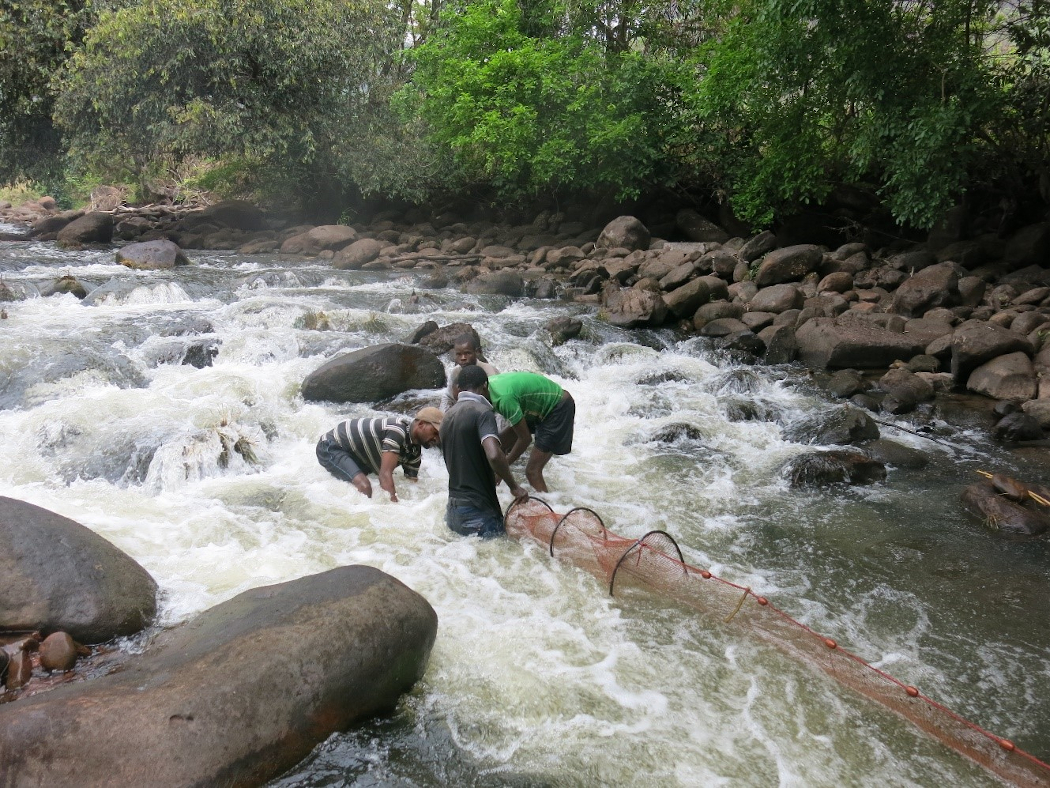
Placing of a fyke net in the rapids of the Luiji River (Buffer Zone of the Kundelungu National Park) for the fishing of rheophilic fish (04/11/2017).
Lewis Ngoy Kalumba
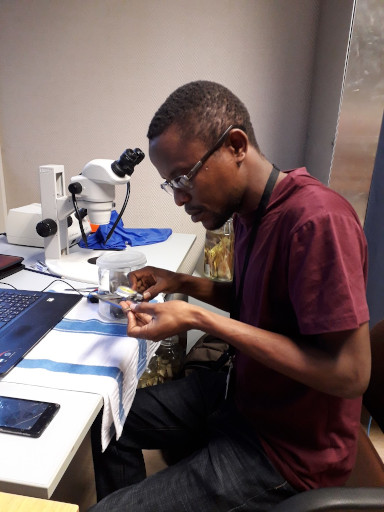
July-October 2019
Lewis Ngoy Kalumba is a researcher at the Biodiversity Research Unit, Management and Sustainable Use of Wetlands (BEZHU), Faculty of Agricultural Sciences, University of Lubumbashi (UNILU), Democratic Republic of the Congo (DRC) and a DEA student in the Renewable Natural Resources Management (RNRM) (2017-present), within the same university's Biodiversity field of study. His studies are supported by the Belgian Development Cooperation (BDC) through the Mbisa-Congo Project I & II, two framework agreement projects of the RMCA, and by the project «Exploiting the Genomic Record of Living Biota to Reconstruct the Landscape Evolution of South Central Africa» (2015-2020) of ZSM. His DEA study aims to contribute to the taxonomic revision of the genus Kneria Steindachner, 1866 (Gonorhynchiformes: Kneriidae) in the Bangweulu-Mweru ecoregion.
Lewis Ngoy Kalumba carried out a study visit in ichthyology at the Royal Museum for Central Africa (RMCA) during three months, from July to October 2019. This study visit aimed to contribute to the taxonomic revision of the genus Kneria Steindachner, 1866 (Gonorhynchiformes: Kneriidae) in the Bangweulu-Mweru ecoregion and focused on the diversity of the genus in the two rivers, i.e. Luanza River and Luongo River, respectively, and this:
- to refute the presence of K. wittei in the Luanza and to describe the two new Kneria species present respectively up- and downstream of Kyanga (Sanshifolo) Falls on the Luanza River;
- to distinguish K. pauscisquamata from the other two Kneria species living up- and downstream of Mumbuluma Falls on the Luongo River;
- to establish the sexual differences of species living in these two rivers;
- to evaluate the systematic value of the opercular and post-opercular organ present in males only.
"The advent of the Mbisa-Congo project has enabled me to place myself at an international level of scientific knowledge. I gradually managed to integrate myself into the field of ichthyology, by getting in touch with the ichthyologists in our laboratory trained thanks to this project. The meetings organized three times in Lubumbashi as part of the project allowed me to expand: (i) my network of human knowledge throughout the country as well as other countries sharing the Congo Basin, and (ii) my scientific knowledge in terms of software programs (Cartography, statistics, photography, etc...). These meetings also allowed me to meet Professor Emeritus Carl Hopkins and Dr. John Sullivan from the USA (Cornell University) who have developed and strengthened my knowledge of electrical signals in Mormyridae. Through this project, I had the honour to orally present the results of my study on the Kneria of the Luanza and Luongo rivers at the PAFFA 6, in Malawi, and this has further allowed me to get in touch with ichthyologists from all over the world."
"In terms of guided tours organised by Muriel Van Nuffel of the RMCA: (1) the visit to the Royal Palace and the Royal Museum for Central Africa (RMCA) itself reinforced my cultural knowledge and my knowledge of the historical relations between Belgium and the DRC, my home country; and (2) the visit to the Han Caves reinforced my knowledge of geological phenomena and especially the discovery of the smoke of the Chernobyl pollution in this cave has also shown me why to care about the protection of the environment."
"The importance of this study visit to the RMCA is for me, first, that it raised my level of scientific research regarding African fish systematics, and second, that it allowed me to deepen my knowledge of the genus Kneria in particular. This knowledge may be useful for new students in our BEZHU/UNILU laboratory (DRC) who are interested in ichthyology and for the state and/or private institutions which might also be interested."
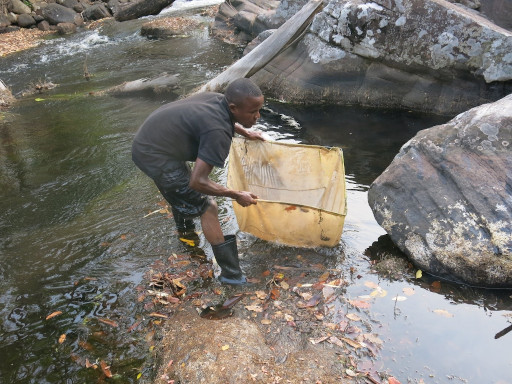
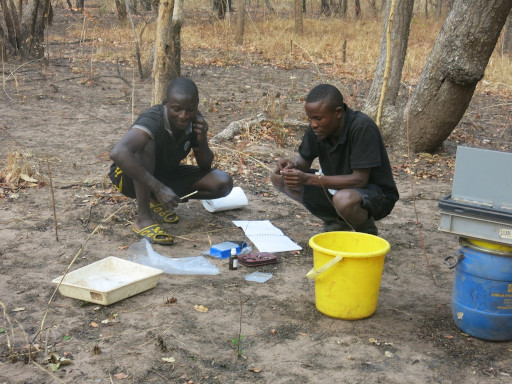
Kiwele Mutambala Pacifique
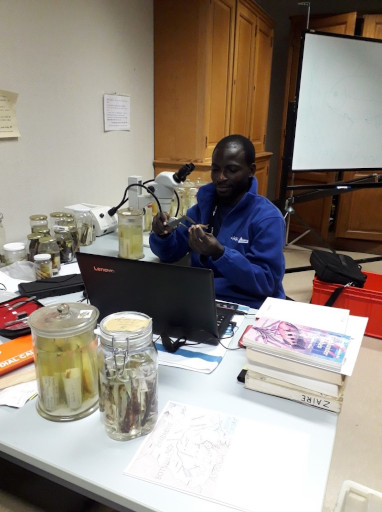
August-September 2019
Kiwele Mutambala Pacifique (KMPF) is from the Democratic Republic of the Congo (DRC). He is a member of the scientific staff of the "Université de Lubumbashi" (UNILU), where he is assigned as a teaching assistant to the Faculty of Agronomic Sciences (FAS). At the UNILU, he is enrolled for a DEA (2018-present) organized locally at the "Unité de recherche en Biodiversité et Exploitation durable des Zones Humides" (BEZHU/FSA), where he works as a researcher in the field of Ichthyology. During this studies, he is working on the subject entitled: The genus Parakneria Poll, 1965 (Gonorhynchiformes: Kneriidae) in the Upper Lualaba and Luapula-Mweru basins (Upper Congo; DRC). His participation to this DEA is supported by the scholarship awarded to him by the Zoologische Staatssammlung München (ZSM, Germany) project "Exploiting the Genomic Record of Living Biota to Reconstruct the Landscape Evolution of South Central Africa" (2017-2019) funded by the Volkswagen foundation and further supported by the Mbisa-Congo I and II projects.
KMPF has, as part of the Mbisa-Congo II project (2019-2023), undertaken a study visit in ichthyology at the Royal Museum for Central Africa (RMCA) between August and September 2019. The main objective of this three-month visit was to allow him to finalize his DEA dissertation by integrating the results of the two case studies in progress since his first visit (May-June 2017). It concerns, next to others:
- one related to the description of the Parakneria specimens recently collected in the main channel of the upper Lufira, from which no Parakneria has ever been reported to date, i.e. about 1 km from its left bank affluent the Panda River, as belonging to a new species for science;
- one whose objective is to demonstrate with film and photos the ability of the Parakneria thysi of the Luvilombo River to climb up the waterfalls.
In addition, this visit also enabled him to analysis the data of a third case study related to the diversity of the genus Parakneria in the Upper Lualaba Basin, in which P. cf. damasi collected from the tributaries of the main canal of the Lualaba River, such as the Fungwe, Kalule Nord and Mwanza rivers in the Upemba National Park (UNP); as well as the Mukuleshi and Lubudi rivers show mainly morphological differences between them and with specimens from the typical locality of P. damasi. Finally, it also led to the advancement of the Kneriidae family review, the key to the genera of this family and the description of the genus Parakneria and its species in Kundelungu and Upemba National Parks as a contribution to the books , in preparation, for fishes in these two National Parks.
"The MRAC-UNILU-ZSM partnership has made it possible for me to be one of the collaborators who benefited from Mbisa-Congo I (2013-2018) logistic support in their research. In this context, since 2015, I have participated under the supervision of one of the doctoral students of the Mbisa-Congo I project, M. Emmanuel Abwe, in a considerable number of expeditions organized in the Kundelungu National Park (KNP) and its surroundings. This has enabled me to develop an enthusiasm and curiosity in the domain of ichthyology. Thanks to these, I am able to identify the majority of the fish of the KNP and its surroundings. In addition, the Mbisa-Congo project, as a school, has allowed me to gain knowledge in:
- the manipulation of programs processing statistical, cartographic and genetic data;
- the interpretation of the related results;
- the oral or written communication of these."
"Thus, the first results of our DEA, mainly obtained during our first visit to the RMCA (2017) funded by the RMCA's ABIC program in collaboration with the ZSM project "Exploiting the Genomic Record of Living Biota to Reconstruct the Landscape Evolution of South Central Africa" (2017-2019), were first presented orally at the evaluation meeting of the Mbisa-Congo I project held in September 2017 in Lubumbashi. Further, these results have also been presented during an oral communication held in 2018 in Mangochi (Malawi), during the sixth conference of the Pan-African Fish and Fisheries Association (PAFFA), to which my participation had been supported by the Mbisa-Congo I project."
"This visit to the RMCA was of a crucial importance, as it has allowed a significant progress in the finalization of my case studies, and consequently to improve the scientific quality of my DEA thesis. This will allow me to consolidate a good future as an assistant and researcher in the field of ichthyology. In addition, it led to the sharing of knowledge with the other collaborators of the Mbisa-Congo II project with whom we also spent unforgettable moments during the different excursions organized by Muriel Van Nuffel of the RMCA administration."
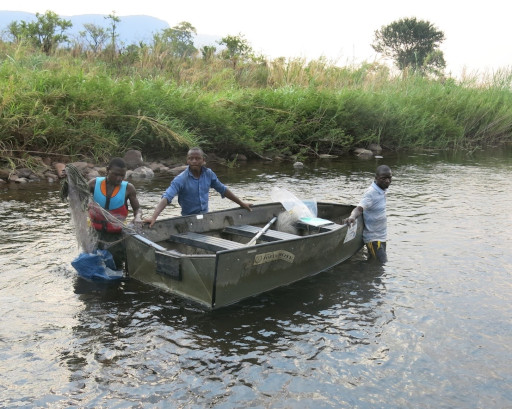
Taylor Mambo Baba
April-June 2018
Taylor Mambo Baba is a researcher at the Centre de Surveillance de Biodiversité (CSB) of the University of Kisangani (UNIKIS) in the Democratic Republic of Congo (DRC) and a DEA student in Ecology and Management of Animal Resources at the same University. His studies are financed by the Belgian Development Cooperation (CBD) through the Mbisa-Congo Project, a framework agreement project of the RMCA. His DEA deals with the fish fauna of the Yangambi Biosphere Reserve in the Democratic Republic of the Congo.
Taylor undertook a study visit in ichthyology at the RMCA from April to June 2018. Specifically, this visit on the study of the fishes from the Yangambi Biosphere Reserve (YBR) in the DRC focused on: (1) updating the current list of the fishes from the YBR which dates from 1963 and this by checking some preliminary identifications of specimens recently collected in the YBR against type specimens, i.e. the specimens(s) which have been used for the original scientific description of the species, and other ancient collections of the RMCA; and (2) a case study of a group of elephant snout fishes (family : Mormyridae) of the Congo Basin for which the results demonstrated that (i) a species currently considered non valid (a junior synonym) is to be revalidated and (ii) another species is new to species and needs to be described. YBR is known with 201 fish species (Gosse, 1963). Moelants (2014) reported 101 species in the southwestern part of the Reserve. According to our studies the YBR currently contains 268 fish species, of which 25 described after Gosse (1963), 8 new species to be described for science and 34 that exist in the Congo Basin out of the reserve.
Taylor Mambo Baba with an elephant fish of the genus Marcusenius (family: Mormyridae).
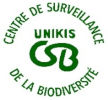
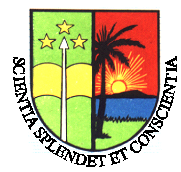
"With the Mbisa project, I benefited from a quality training in fish systematics through the experts of the RMCA. The data-analyses with appropriate programs and the interpretation of these results, notions of mapmaking and soon an introduction to the recording of the electrical signals of elephant fishes (family Mormyridae) to help locate specimens and differentiate as well as identify species. This visit also allowed me to meet other African researchers from Algeria, Congo-Brazzaville, Benin, Burkina Faso and Madagascar in the field and thus strengthen my professional network. As far as the guided tours organized by RMCA are concerned, the most interesting for me is that of the port of Antwerp and the Antwerp Zoo with a high diversity of animals (Insects, Mammals, Birds and Fish)."
"The importance of my study visit to the RMCA is that it raised me to an international level with regard to my scientific research in systematics of African fish. This knowledge, I will now be able to transmit it to all fellow researchers and students at the University of Kisangani (UNIKIS) who are interested in the field. The discovery of a new fish species for science and the revalidation of another one remains unforgettable to me."
Fyke-net fishing: a fishing technique that is particularly efficient for collecting elephant fish (family: Mormyridae). Nepoko River in the Okapi Wildlife Reserve (RFO) (08/11/2017).
Fishing with a dip net in the Lusambila River of the Yangambi Biosphere Reserve (RBY) with a student in his second year of the Bachelor degree in Biology from the University of Kisangani, Faculty of Sciences (UNIKIS) (10/27/2014).
